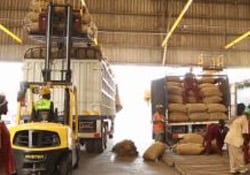Cocoa farmers get the wheels turning on economic opportunity
New trucks solve an old problem in Côte d’Ivoire
July 21, 2016
If you’ve ever driven an old, unreliable car in a remote area with rough roads, you know that getting from point A to point B can be difficult – and you travel with constant concern that the vehicle might break down at any moment. Now imagine your very livelihood depended on transporting goods under these conditions every day.
 “With Doni Doni, we spend less money on old trucks and when we get the new trucks, the costs that we have saved by not having to repair old trucks will help us pay for the new trucks,” said Sawadogo Moussa, Chairperson of Cooperative SCINPA.
For cocoa farmers and cooperatives in Côte d’Ivoire, logistics can be a huge challenge. The trucks they use to transport their cocoa beans to the point of sale are often timeworn and undependable. This makes it complicated for them to operate with great efficiency and impacts their economic success.
“With Doni Doni, we spend less money on old trucks and when we get the new trucks, the costs that we have saved by not having to repair old trucks will help us pay for the new trucks,” said Sawadogo Moussa, Chairperson of Cooperative SCINPA.
For cocoa farmers and cooperatives in Côte d’Ivoire, logistics can be a huge challenge. The trucks they use to transport their cocoa beans to the point of sale are often timeworn and undependable. This makes it complicated for them to operate with great efficiency and impacts their economic success.
The logical solution? Invest in new trucks. But, new trucks are expensive and the cost of loans can be prohibitive. That’s where the “Doni Doni” affordable commercial loans initiative – a partnership of Cargill and the International Finance Corporation and part of the Cargill Cocoa Promise – comes in.
Through the Doni Doni project, which means “step by step” in the Dioula language, farmer organizations that have taken part in Cargill’s Coop Academy, an industry-first mini-MBA program, can get new trucks through a three-year leasing deal that includes insurance.
“With Doni Doni, we spend less money on old trucks and when we get the new trucks, the costs that we have saved by not having to repair old trucks will help us pay for the new trucks,” said Sawadogo Moussa, Chairperson of Cooperative SCINPA. “We will be repaying the trucks step by step through the sale of our cocoa beans.”
Flexible finance of this kind helps cooperatives save time and money by running new trucks, so they get a long-term return on their investment and move a step closer toward financial independence.
“Access to funding has always been the major issue preventing us from reaching this objective,” said Lional Soulard, managing director of Cargill West Africa. “As far as I know, the Doni Doni project is a major and unique step in the cocoa industry. Indeed, so far it has allowed 43 cooperatives to lease 78 new trucks and to access more than $1.7 million U.S. in funding, with exactly similar terms as in any other company.”
The Minister of Agriculture for Côte d’Ivoire, Mamadou Sangafowa Coulibaly, commends the program, as well. “Cargill showed us that we can not only set up viable professional cooperatives, but these cooperatives can also access private funding, and this is very important,” he said.
The program is so pioneering that Food Ingredients Europe named it winner of the FiE 2015 Best Sustainability Innovation Award. The FiE Awards judging panel explained, “Environmental strategies alone are no longer exceptional but the norm. Actions that extend beyond the environmental and incorporate social, cultural and economic initiatives embody the true scope of sustainability.”
It’s easy to see that step by step, initiatives like the Cargill Coop Academy and the Doni Doni project can help cocoa farmers make leaps and bounds of improvement in their businesses and livelihoods.
“By being in partnerships with companies like Cargill, we are able to discuss and agree on different projects, such as educational infrastructure. When you have a project like the Cargill Coop Academy, which allows you to train cooperative managers, naturally we support this because it benefits all,” said Massandjé Touré-Litsé, managing director of Conseil Du Café Cacao. ““Only in partnership with the private sector can we achieve what is needed.”
